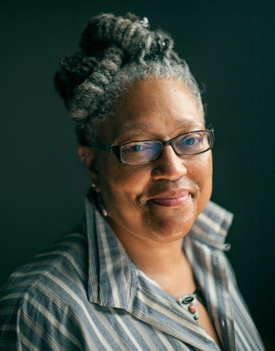
Students at Vanderbilt Divinity School “don’t get to shut the world out” and neither does the city of Nashville, Emilie Townes told the Rotary Club of Nashville on Monday. Townes, the E. Rhodes and Leona B. Carpenter Chair and professor of womanist ethics and society, outlined the lessons about growth and change she’s learned from her perspective as Divinity School dean since joining the university in 2013 from Yale Divinity School.
“We exist in a city that is growing by leaps and bounds,” Townes said. “We must keep an eye on the past, present and future. [rquote]The change we seek will be what we find in large measure, but it also will happen in the unexpected and the unplanned.”[/rquote]
Townes provided eight recommendations for leaders based on her experiences:
- Lay the groundwork for growth and change. Take time to learn from “folks who have already been there.”
- Look at other ideas but understand they might not work in every context. “It is important to be eclectic, but wise, in using other ideas,” she said.
- Communicate, communicate, communicate.
- Strive for transparency and work to build trust. Understand that transparency “does not mean throwing confidentiality or strategic rollouts out the window.”
- Patience and timing are critical. “Too fast, too soon, too slow or too late usually means too irrelevant,” Townes said.
- Strive to build understanding with colleagues. For Townes, that has meant getting to know and appreciate the faculty as scholars and teachers. Her role, in turn, is to provide structure and context.
- Think locally, regionally, nationally and globally.
- The “financial house” must be in order. “But we should not let all of our planning be driven by funding,” she said, adding that creativity and strategic partnerships can sometimes help fill the gaps.
Townes emphasized staying true to mission, whether in the city or in the Divinity School, with a commitment to “thoughtful change.”
During the question-and-answer session, Townes was asked about ways to bridge cultural and religious divides, whether in a college setting or in a city. She said one of the Divinity School’s most important tasks in training Christian ministers is teaching them to articulate not only their own faith but those of other religions. A “curriculum transformation” underway at the Divinity School will increase the amount of interreligious dialogue.
Every religion, she said, has a fringe element. “My challenge is to know who that fringe is and what they’re about to be able to understand them and then understand how to work with those who are the majority and generally peaceable to discover where the bridges are built,” she said.
As a newcomer to Nashville, Townes “sees things that people who’ve been here a while don’t.” She’s noticed “a very real and interesting” religious diversity in Nashville that should be appreciated and explored.
“We don’t have to all agree religiously, but we do have to listen and learn from one another,” she said. “That would be one of the great spiritual gifts.”